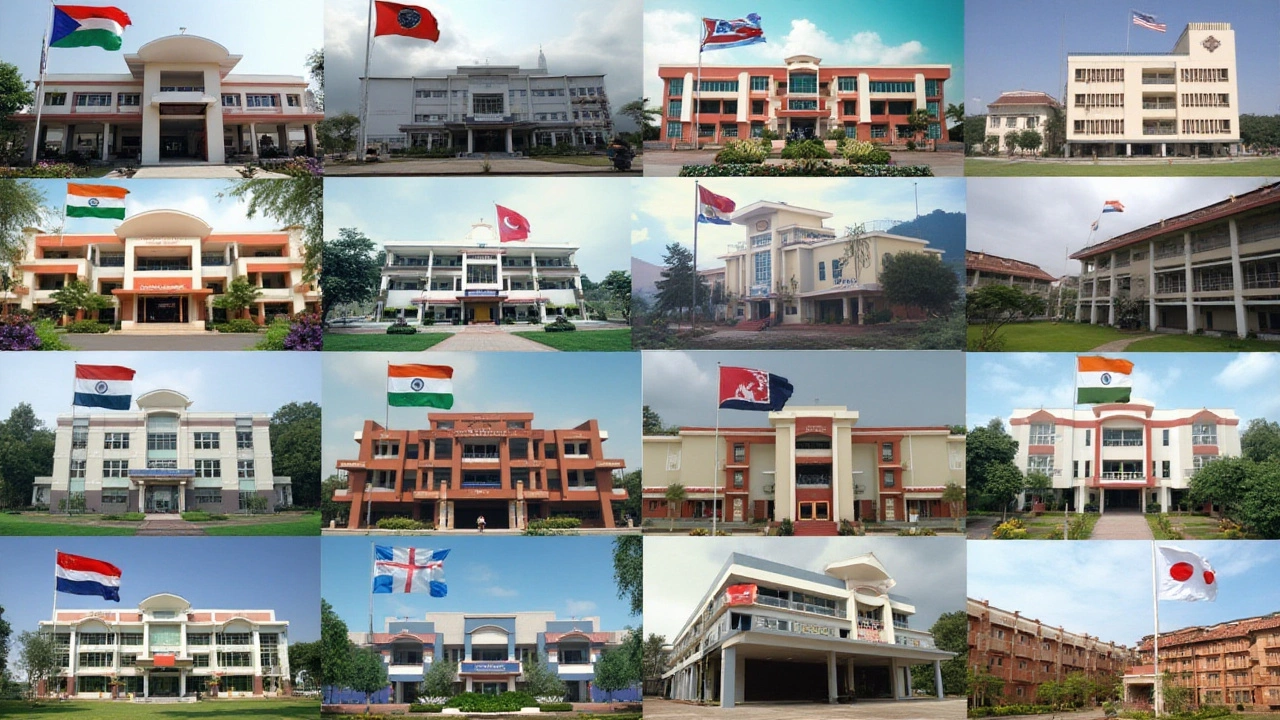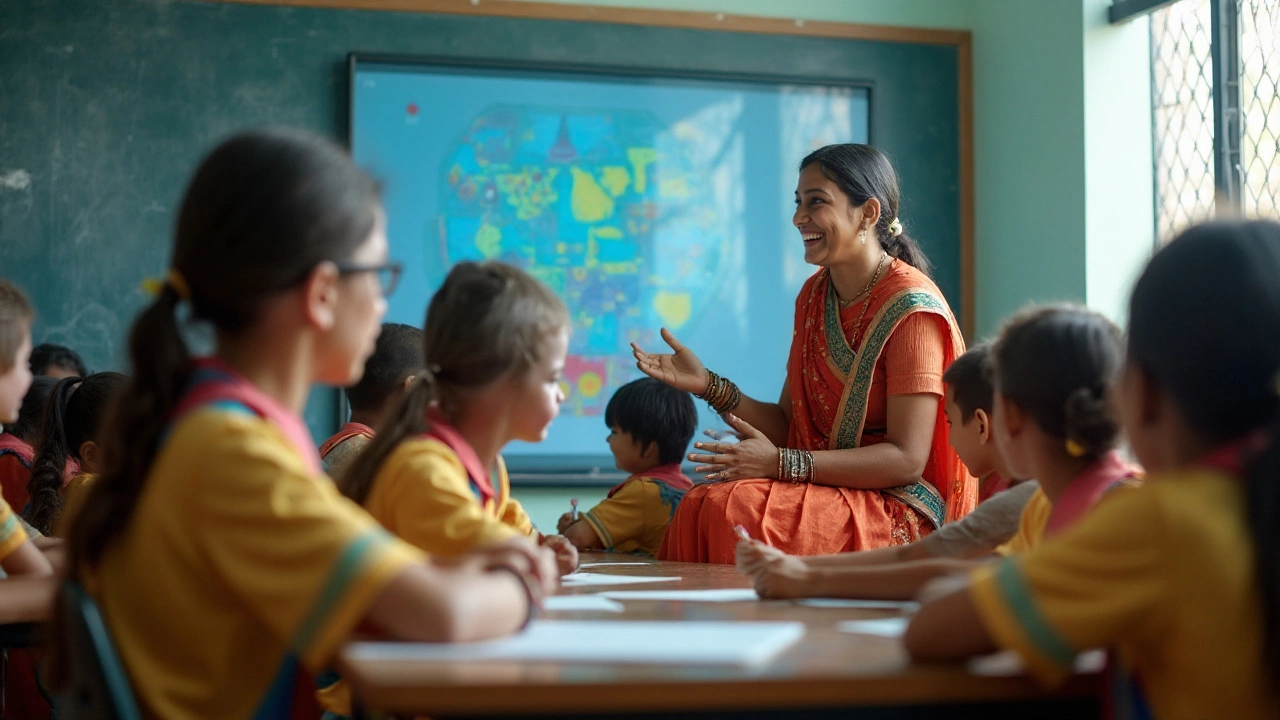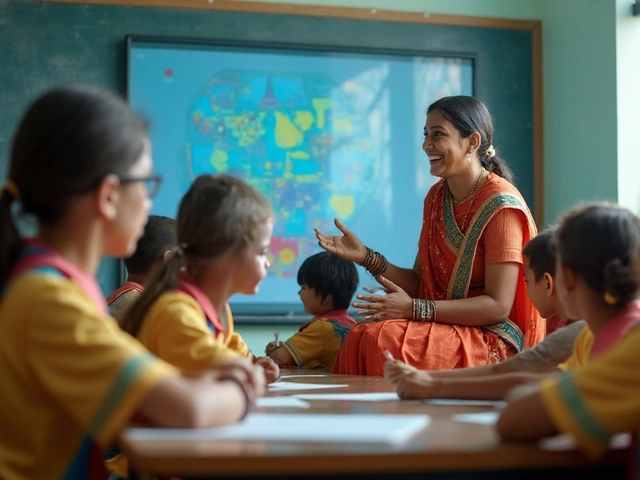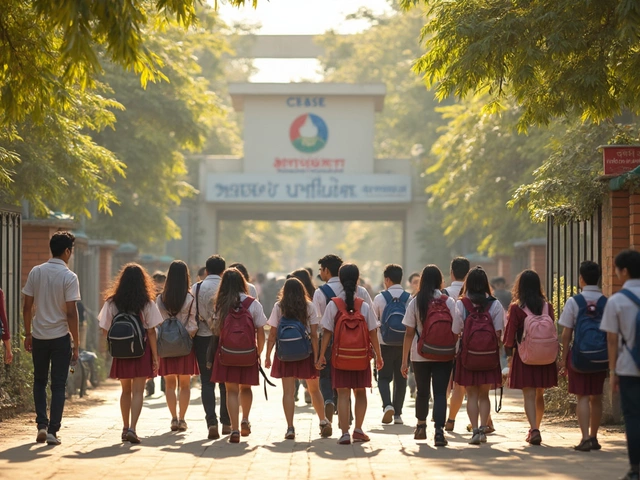Education forms the backbone of any society, offering young minds the tools and knowledge required to succeed in an ever-evolving world. Among the myriad of educational boards out there, the Central Board of Secondary Education, commonly abbreviated as CBSE, stands out prominently. Established in India, this board has grown to become a household name within and beyond its country of origin.
Many parents and students globally view CBSE as the gold standard for school education, not just due to its comprehensive syllabus, but also because of its strong emphasis on analytical skills and holistic development. The popularity of CBSE is not simply a result of tradition; rather, it is a combination of innovation, adaptability, and a global view of educational standards that draws students from various cultures and backgrounds.
Diving into the dynamics of CBSE, one can observe a curriculum that's structured to challenge the intellect, while also nurturing creativity and critical thinking. In this article, we shed light on the reasons behind the fame of CBSE, its global position, and share practical tips for flourishing under this educational board.
- Introduction to CBSE
- Global Reach of CBSE
- Unique Features of the CBSE Curriculum
- Impact on Students' Development
- Tips for Students and Parents
Introduction to CBSE
The Central Board of Secondary Education (CBSE) is a preeminent educational board that many schools across the globe choose due to its meticulously crafted curriculum and dynamic approach to learning. Originating in 1962, CBSE was established under the jurisdiction of the Government of India, and its mission has resonated strongly with educators and learners alike. It represents a system that promotes academic excellence through the comprehensive CBSE syllabus, fostering a learning environment designed to prepare students for the challenges of higher education and future careers.
Marked by its ability to constantly adapt and stay relevant, the CBSE ensures its curriculum is abreast with the latest educational trends and technological advancements. This balance of tradition and innovation sets it apart from other educational frameworks. The structured modules include not just core subjects like mathematics, science, and social studies, but also emphasize extracurricular subjects to enrich the student's learning experience. The CBSE curriculum encourages students to explore various fields and pursue knowledge beyond textbooks, which is instrumental in building critical thinking and analytical abilities.
"CBSE offers a well-rounded education that focuses on both academic and life skills, preparing students for global citizenship," as noted in a report by the Hindustan Times.
Another key feature that contributes to the board's popularity is its widespread adoption. It's not just confined to India; schools in over 25 countries have incorporated the CBSE framework to match the demands of expatriate students seeking an internationally accredited curriculum. What stands out about CBSE is its unique grading system, which shifts focus from rote learning to a more holistic evaluation of students’ capabilities. It steers away from just memorization and simple theoretical knowledge, encouraging a practical understanding of subjects.
Parents frequently choose CBSE not only for its global recognition but also for its emphasis on continuous comprehensive evaluation, which consistently refines and assesses a student's abilities throughout the year. This approach allows educators to tailor their teaching methods to meet the diverse needs of students, making learning an inclusive process. Data indicates that students who participate rigorously in the CBSE education system exhibit higher levels of aptitude in skills necessary for top-tier universities and professional arenas worldwide.
Considering its extensive reach and impact, many international high schools have started adopting the CBSE framework, contributing to the board's influence beyond geographical boundaries. This cross-cultural exchange enriches the educational experience further. Adherence to a high standard of teaching, well-defined curriculum, and versatile evaluation strategies are what make CBSE a preferred choice for those seeking quality education. As the educational landscape evolves, CBSE continues to play a pivotal role in shaping tomorrow’s thinkers and leaders.
Global Reach of CBSE
The global reach of the Central Board of Secondary Education is a testament to its adaptability and the quality of its syllabus. Originally established to cater to the educational needs within India, CBSE has transcended geographic boundaries over the years, establishing thousands of affiliated schools across various countries. From its inception in the 1960s when it was confined to select regions of India, CBSE now spans continents, with schools in Asia, the Middle East, Europe, and North America. This international spread is driven by a growing global Indian diaspora seeking to provide their children with a consistent educational experience akin to that in India, reflecting the board's robust and flexible curriculum.
CBSE's influence can be seen prominently in the Gulf region, where countries like the United Arab Emirates and Qatar host numerous CBSE-affiliated schools. These institutions cater to the Indian expatriate community and beyond, appealing to local and international families who recognize the value of an education system that emphasizes analytical and critical thinking. Schools outside India often cite the quality of education and the comprehensive nature of the CBSE syllabus as the primary reasons for adopting this board. Additionally, the English-medium instruction that CBSE provides further enhances its attractiveness globally, especially among those for whom English is a second language.
According to a report by the National Institute of Education Planning and Administration, there are over 200 schools affiliated with CBSE outside India. These schools follow similar academic calendars and exam schedules, ensuring a uniform educational experience for students, regardless of their location. The emphasis on science and mathematics in the CBSE curriculum has also made it popular among students aspiring for higher education in technical and scientific fields worldwide. Educational institutions, therefore, see CBSE as a gateway to prestigious universities across the globe, especially in countries like the USA, Canada, and the UK.
In many countries, CBSE schools are not just hubs for academic learning but also serve as cultural centers that help maintain the Indian ethos while blending with the local environment. They often organize cultural events, festivals, and activities that celebrate Indian art and heritage, providing students with a wholesome educational experience. This includes annual festivals that not only connect students with their roots but also introduce the Indian cultural spectrum to international communities. A principal from a CBSE school in Dubai once remarked, "CBSE creates a culturally rich environment for learning where students can excel academically while staying connected to their heritage."
Beyond the classroom, CBSE's growth has been bolstered by its dynamic approach towards education, evolving to include futuristic subjects and technology integration in its curricula. This includes new courses in Artificial Intelligence and coding, preparing students not just for today but for tomorrow's opportunities. Indeed, the board continuously updates its syllabus to incorporate emerging global trends, ensuring that students of all backgrounds are ready to excel in competitive environments. In recent years, the CBSE's approach to assessments, which emphasizes understanding over rote learning, has gained international acknowledgment, drawing parents globally towards its pedagogical philosophy.

Unique Features of the CBSE Curriculum
When exploring the CBSE curriculum, its uniqueness becomes evident through a series of well-considered educational strategies and systems. This educational board is not merely a repository of academic content but a dynamic framework designed to cater to diverse learning styles and future-readiness. A standout feature of CBSE is its emphasis on the conceptual clarity, urging students to understand the 'why' behind the facts. This focus encourages deeper learning and equips students to tackle analytical problems with ease. For instance, subjects like mathematics and science are designed not merely for rote learning but to inspire curiosity and innovative thinking.
The board introduces a well-rounded approach to education that equally values academics with co-curricular achievements. Students are encouraged to participate in sports, arts, and cultural activities, which are seamlessly integrated into the curriculum. This balance ensures that the mind and body are developed in parallel. Another distinctive feature is the board's inclination toward technology-enhanced learning, making it compulsory for students to engage with digital tools and resources. This aligns with the skills needed in the digital age, preparing students for a tech-driven world. A truly comprehensive syllabus, CBSE also incorporates life skills education and value-based learning, helping students not just score high in exams but also emerge as socially responsible and emotionally intelligent individuals.
Assessment under CBSE syllabus is another area that epitomizes its unique model of education. The Continuous and Comprehensive Evaluation (CCE) was introduced to shift away from the paradigm of end-term examinations to a system where students are continuously evaluated on various skills throughout the year. This includes oral tests, project works, and class participation, which offer a more holistic view of a student’s abilities. Such an assessment model reduces the stress of annual exams and promotes consistent academic effort. A representative from CBSE once noted,
"Our aim is not only to create toppers but thinkers, innovators, and leaders of tomorrow."This change in strategy echoes CBSE's educational philosophy and mission statement.
Integration of Global Trends
The CBSE curriculum does not operate in an educational vacuum. It strategically integrates global educational trends, keeping its content relevant and competitive on an international level. Courses in languages offer a wider array of multicultural literature, and global events and histories are part of the social studies syllabus, fostering a global perspective among students. Additionally, subjects linked to future trends such as environmental education, artificial intelligence, and financial literacy are part of the curriculum, aligning academic learning with real-world applications. This approach ensures students are not just aware of, but are actively engaging in global conversations. Moreover, CBSE actively encourages exchange programs and international collaborations, giving students real exposure to global learning environments.The widespread popularity of the CBSE syllabus can also be attributed to the board's constant evolution and adaptation. It not only adopts policies in sync with contemporary educational needs but also reaches out to educational experts for regular updates and reviews of the syllabus. This system of accountability ensures the content remains rigorous, comprehensive, and in tune with the latest advancements in education. By fostering an environment of critical thinking, practical application, and adaptive learning, CBSE shines as a beacon for modern education, preparing students globally for both academic excellence and life beyond.
Impact on Students' Development
The CBSE syllabus is renowned for shaping well-rounded individuals ready to take on the challenges of the world. Its focused approach on both scholastic and co-scholastic achievements means students don't just learn subjects but also develop critical skills that are essential in real life. Students are consistently groomed to understand a broad spectrum of topics that crucially include moral science, physical health, and value education, alongside the standard subjects. The core objective of CBSE is to equip learners with an education that is not just academically rigorous but also practically applicable, encouraging a proactive mindset.
One distinguishing feature of the educational board is its emphasis on transition from rote-learning to a more analytical and thorough understanding of concepts. This is seen in their introduction of the Continuous and Comprehensive Evaluation, a system focused on students' creative and analytical skills. It led a shift in traditional teaching methodologies in India and elsewhere, nurturing adaptability and problem-solving skills, which are vital in today’s fast-paced world. A survey by the National Council of Educational Research and Training reported that CBSE students exhibited improved problem-solving skills and creativity compared to their peers from different boards.
Building Global Competency
The global acceptance of the CBSE curriculum is noteworthy. Schools in several countries adopt the syllabus due to its clear structure and international relevance, preparing students effectively for competitive exams worldwide. The syllabus design keeps in mind the changing trends across sectors and integrates such relevant elements within its framework. For instance, the inclusion of Artificial Intelligence and coding in the curriculum ensures that students are well-prepared for the demands of future-tech careers. It actively contributes to a student’s capability to adapt to various educational systems and standards across the world.
The board’s format cultivates a competitive spirit through systematic inclusion of rigorous assessments. Many students pursuing studies under CBSE have expressed how these assessments challenge them constructively, building resilience and an aptitude for handling pressure. An alumnus from a CBSE school remarked, "The CBSE curriculum has uniquely prepared me to face not just academic tests but life’s trials as well."
"A focus on continuous learning and adaptation without sacrificing depth is what sets CBSE apart," noted a senior educator from the Education World magazine.
Nurturing Creativity and Innovation
Beyond cognitive development, CBSE pays keen attention to nurturing a student’s creativity and personal growth. Art, music, and sports have been made integral to the curriculum, ensuring that students embrace a balanced lifestyle. The real-world applications of this approach are evident as students often pursue varied interests and careers post-schooling, showing a versatility nurtured by these formative experiences. Students often participate in annual exhibitions and competitions that encourage innovation, making learning not just a task but an exciting venture. Families and educators often see a notable improvement in a student's self-esteem and confidence, fostered by the board's holistic model.

Tips for Students and Parents
Engaging effectively with the CBSE syllabus requires a balanced approach that combines discipline, curiosity, and strategic planning. For students, the first step is understanding the syllabus comprehensively since it serves as a guiding framework for what will be covered in classes, exams, and evaluations. Parents, on the other hand, play an essential role in creating a supportive environment that fosters academic excellence and personal growth. Attending parent-teacher meetings and participating in school events can provide insights into the child's progress and areas where they might need extra support.
It's essential for students to develop a consistent study schedule, one that allocates ample time for all subjects while also incorporating breaks to recharge and relax. The CBSE syllabus is extensive, covering a wide range of topics, making it crucial not to leave preparations until the last minute. Parents should encourage their children to set achievable goals, celebrate milestones when they are reached, and reflect on any setbacks without harsh criticism, instead understanding them as learning opportunities.
Active participation in classroom activities can significantly enhance a student's grasp of the material taught. This participation should be accompanied by forming study groups, which can be tremendously beneficial. These groups provide the chance to discuss topics in detail, helping students address doubts and gain different perspectives on complex subjects. Parents can assist by providing a conducive study space at home, free from distractions like television or video games during study hours.
An essential tip for students is to become familiar with past question papers and mock tests. This practice not only boosts their confidence but also allows them to identify patterns in how questions are formulated, prepare accordingly, and use time efficiently during real exams. Parents can play a part by timing these practice sessions and helping with revisions if possible. Knowing how to manage time during exams is a skill of paramount importance. A steady rhythm and methodical approach to solving papers often create the difference between good and great scores.
As Dr. Ramesh Pokhriyal, former Education Minister of India, once mentioned, "Education is the way to build a society without prejudice, an educated mind sees the world through a lens of perspectives, not preconceptions."
Additionally, health plays a crucial role in a student’s ability to perform academically. Ensuring that they have a balanced diet, adequate sleep, and physical activity should not be overlooked. Parents should encourage children to pursue hobbies or physical exercise that alleviate stress while enhancing concentration and memory. For this reason, many schools implementing the CBSE syllabus provide ample opportunities for extracurricular activities, which are equally beneficial for a child’s development.
Finally, both students and parents should stay informed about changes within the CBSE framework. Since it's a dynamic board with occasional updates or modifications to the curriculum, staying informed ensures that students are prepared according to the latest standards. Engaging with teachers and school counselors can offer valuable insights and guidance aligned with the best interests of the child and their academic journey.



